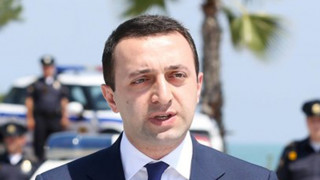On 4 April 2014, the Prime Minister of Georgia held a press conference. One of the journalists representing Tabula magazine spoke about the issue of criminal statistics and indicated that detailed statistical data on crime in Georgia has not been published since March 2013 and asked the Prime Minister to take this fact into consideration. In response to this remark, Irakli Gharibashvili declared: “The Ministry is absolutely transparent and open. Show interest, ask for statistics… Statistical data was published every day during my service at the Ministry. It was my good will, although it has never been an obligation.”
FactCheck looked deeper into the accuracy of the Prime Minister’s abovementioned statement.
FactCheck has been keeping an eye on criminal statistics in Georgia after Eka Beselia’s statement made in the Parliament of Georgia on 7 August 2013 about the decrease in the number of crimes. At the beginning of its research, FactCheck analysed the information presented on the website of the Ministry of Internal Affairs. Of note is that crime statistics were published according to categories, months and regions during the period 2004-2012 and the information was also accessible in the website’s archives (the archives, however, are no longer accessible dating to 2013).
In August 2013 FactCheck withdrew detailed information on the crime statistics of 2011, 2012 and 2013 from the Ministry of Internal Affairs of Georgia by months and categories of crime. The response to our request was delivered in one month’s time instead of the obligatory ten days; however, it did not contain any complete data since the information was not provided by months. In addition, the information was not categorised by types of crime as originally requested by FactCheck. Instead of providing data for up to 80 types of crimes, the Ministry sent information for only 14 types. For 2011, 2012 and the first eight months of 2013, the letter contained only summarised information. Therefore, for its first attempt FactCheck was not able to obtain complete information about crime statistics from the Ministry of Internal Affairs.
Later on, FactCheck resumed its research on Georgia’s crime statistics. On 8 October 2013, at the pre-election meeting in Poti, Giorgi Margvelashvili declared: “Having unprecedented amnesty as a background, the numbers of crimes are small; this means that crime has decreased statistically as compared to the previous year and crimes are solved more often.” On 31 October 2013, FactCheck addressed the Ministry of Internal Affairs once again to investigate the abovementioned information and asked for statistical data on crime according to months. Additionally, FactCheck also withdrew information concerning the changes in the methodology for recording registered crimes. The Ministry of Internal Affairs of Georgia again responded to our request with delay, on 3 December. The Ministry’s second letter contained detailed statistical information by months but failed to clearly explain the changes made to the methodology dating from 2010.
FactCheck addressed the Ministry for a third time with a request for statistical data on 29 January 2014. This time we asked for the data according to categories and months. However, no response has reached FactCheck so far. Of note is the position of the Bureau of Public Information of the Ministry of Internal Affairs. FactCheck has tried several times to contact this Bureau via the telephone number displayed on its website. The Bureau does not answer its telephone.
Since the elections of October 2012, political forces and society are actively debating the issue of criminal activities and their increase or decrease. Paradoxically, one part of society believes that crime has decreased while another part is of the opposite opinion. These different views triggered FactCheck’s interest in this topic.
Of note is that the statistical data provided by the Ministry of Internal Affairs in response to our first contact raised certain suspicions. According to the letter we received, a total of 19,253 crimes were observed for the period January-August 2013. Despite this figure, summarising the categorised criminal cases showed that there were actually 14,858 individual crimes. The information FactCheck received does not contain a category of crimes labelled “other” (or similar) and so it is unclear to which category the remaining 22.8% of the crimes belong. Consequently, FactCheck found it important to identify which crime category served to the decrease of the number of registered criminal cases.
According to the Ministry, before March 2013, there was a 10% trend of an increase in criminal cases. The Ministry has not published statistical data for the subsequent four months (that is, from March onwards). Based upon the data published in August 2013, the number of criminal cases decreased by 18% if compared to the same period of 2012. Therefore, it was important to identify the monthly dynamics in the decrease of criminal cases. For this reason, FactCheck found it necessary to obtain the monthly data pertaining to crime statistics although no success was achieved despite numerous attempts.
Of note is the fact that the data published by the Ministry of Internal Affairs in the first quarter of 2013 contains information on the methodology of recording the data. According to the Ministry, two significant changes were made to the methodology:
- Closed criminal cases, despite the basis for their closure, were not reflected in the official statistical data before 2013.
- For the same period, in order to declare a case closed, it was absolutely necessary to file a charge. Nevertheless, some cases, that were actually closed although without filing charges, were not reflected in a consolidated report in order to avoid the unreasonable increase in the number of closed cases.








